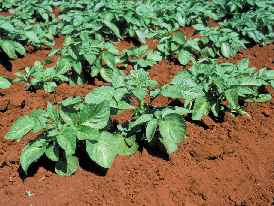This Sunday was originally so called because of the words in the Prayer Book gospel for the day: “Whatever you ask the Father in my name, he will give to you”.
(The Latin is ‘Rogare’ – to ask.) In the strictly biblical context, the chief thing to ask for is the spirit of God to enable us to be true children of God. By the 17th century, the old Roman festival of ‘Terminalia”, or “boundaries”, had been adapted by the church and served a practical purpose. In days before Ordnance Survey maps, there were not always clear lines of demarcation between the parishes, especially where there were open field systems. During the procession, boys were bumped on prominent marks and boundary stones, or rolled in briars and ditches, or thrown in the pond to ensure they never forgot the boundaries.
The Victorians made it more civilised by beating objects rather than people, in the context of a service and procession. In the Western Church, processions to bless the crops and to include “beating the bounds”, developed from the o1d Roman rites of “Robigalia” (“robigo”: Latin for “rust” or “mould”), when prayers would be offered to the deity for crops to be spared from mildew.
These rogation themes of blessing the fields and beating the bounds were commended in the 1630s by the poet George Herbert, that epitome of English country parsons. He said that processions should be encouraged for four reasons:
1 A Blessing of God for the fruits of the field.
2 Justice in the preservation of bounds.
3 Charity in loving, walking and neighbourly accompanying one another with reconciling of differences at the time if there be any.
4 Mercie, in relieving the poor by a liberal distribution of largesse, which at the time is or ought to be used.
Today the emphasis has shifted. A blessing on growing crops in fields and gardens, and on young lambs and calves remain. In the agricultural cycle, the main themes are seed sowing and the tending of the young plants and animals. This does not pre-suppose that all sowing takes place around Rogation. Sowing is done all the year round, as is the birth and rearing of the young, but it is convenient to fix on one particular festival as the time to remember these before God in a public way. Rogation takes place in the springtime, when there is a renewing of the earth. In this country, it follows Easter, the season of resurrection. Renewal and resurrection therefore are also underlying themes of this occasion. Contemporary concerns will include:-
1 The enjoyment by all of, and access to, the countryside.onservation of species not directly offering economic profit to the owner or occupier of the land where they flourish.
2 The ecological insight of the inter-relatedness of the created order.
3 Reflection upon human-kind’s relationship to the natural order. What does it mean to “have dominion” under God over the fish in the sea, the birds of the air, the cattle, the wild animals, and the reptiles, the plants bearing seed, the trees bearing fruit, the green plants? Are the words ‘stewards’ or ‘managers’ appropriate to describe this role?
4 The relief of the poor. Rogation Sunday often precedes Christian Aid week. The Christian ‘virtues associated with Rogation are hope and justice – and as George Herbert reminds us – there is always room for charity.
May He that provided the seed for sowing, the hand for doing, the mind for thinking, and the heart for
loving, the Father, Son and Holy Spirit, bless you and preserve you all the days of your life.


